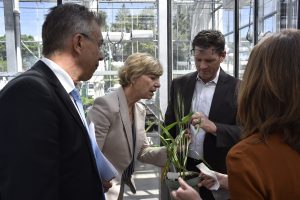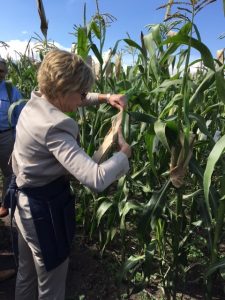EL BATAN, Mexico (CIMMYT) – Bill & Melinda Gates Foundation CEO Sue Desmond-Hellmann visited the

International Maize and Wheat Improvement Center (CIMMYT) this week to learn more about how research reaches smallholder farmers.
During her visit, Desmond-Hellmann spoke with scientists and researchers on how CIMMYT is working to develop new and innovative solutions to end poverty through agriculture. Through a hands-on tour of CIMMYT’s germplasm bank, Desmond-Hellmann saw how the world’s most diverse collections of maize and wheat are providing genetic diversity to breeding programs worldwide to tackle food security and climate change. The science was then put into practice in the field, where the Bill & Melinda Gates Foundation CEO pollinated maize and learned about the complexity of breeding for tolerance to heat and drought and resilience to diseases.
Remote sensing technologies, that make it possible to observe the dynamics of anything from single plants to entire landscapes as they change over time, were also showcased during the visit as an effective and adaptable tool for breeding and crop management including nutrient use efficiency, climate resilience and irrigation systems.

Nutrition and quality were also emphasized as keystones of CIMMYT’s work. Desmond-Hellmann tasted different types of bread, and learned how CIMMYT wheat varieties meet market demands for flour and wheat products globally. A demonstration on how CIMMYT is improving the nutritional quality of crops by enhancing the pro-vitamin A, iron and zinc concentrations of maize and wheat grains showed how agricultural and nutritional sciences are working together to fight “hidden hunger.”
Also joining the visit were Rodger Voorhies, the organization’s managing director of global development, Tony Cavalieri, senior program officer of agricultural development, and Casey Hanewall, the director of the CEO and chief staff office. The Bill & Melinda Gates foundation is one of CIMMYT’s major donors with funding for key projects including Cereal Systems Initiative for South Asia (CSISA) and Stress Tolerant Maize for Africa (STMA). CIMMYT also receives funding for important work like that of developing and deploying maize that resists the deadly Maize Lethal Necrosis disease and projects to develop micronutrient rich maize and wheat varieties.
 Capacity development
Capacity development